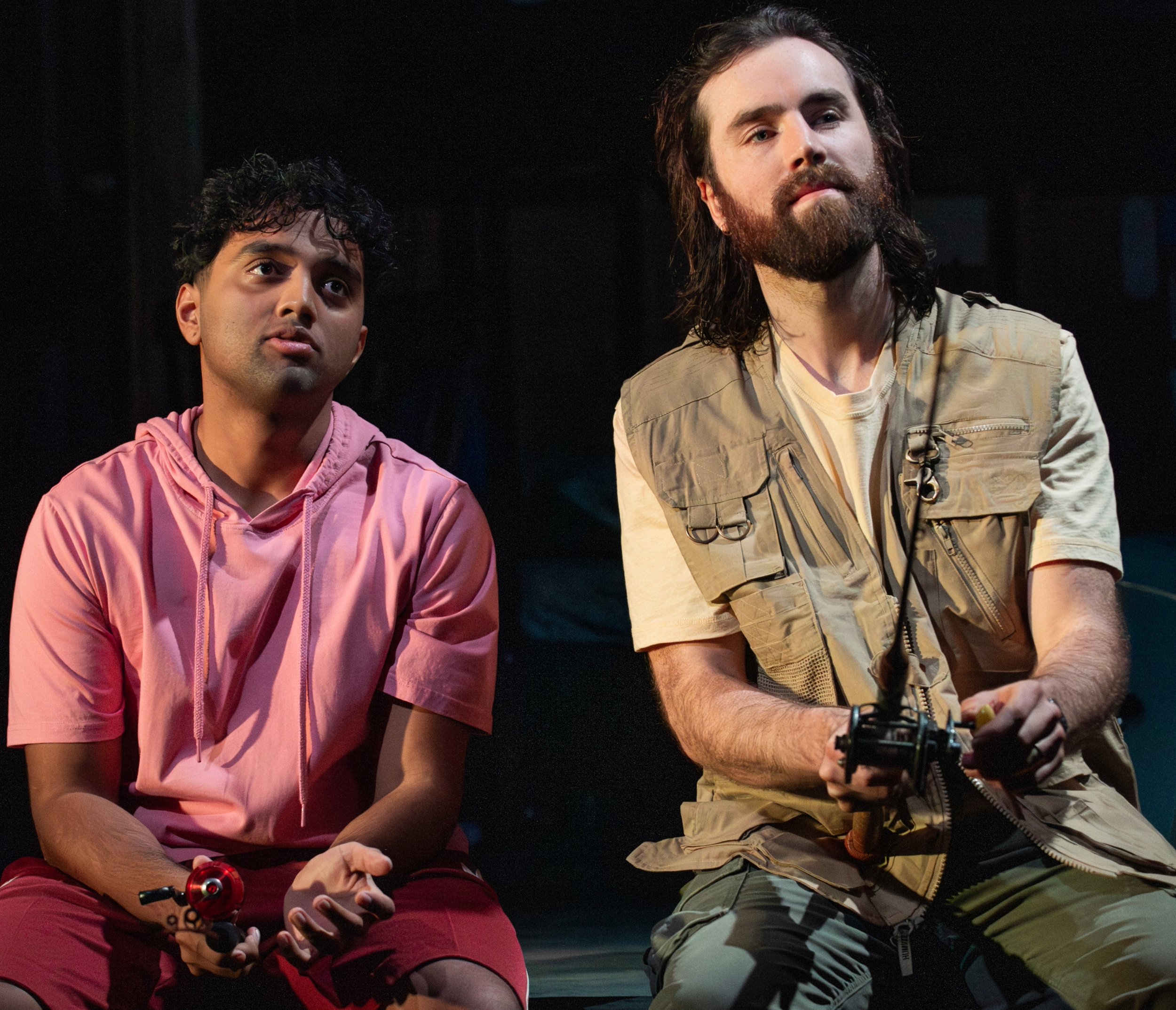Luna (Grace Brennan, left) and Esther (Lark White) are two of the residents of a summer program for those suffering from grief in Eliya Smith’s Grief Camp.
Eliya Smith has chosen the title of her play Grief Camp cannily. The name nails down the setting and the situation, and it allows her to start the proceedings at a low key, with two of her six young people, Brad and Luna, talking in the dark after lights out. It scarcely matters that the audience can’t yet identify who is who, because the chitchat is innocuous: “Are you awake?” “I’m debating if I want to pee.” “I’m sorry about the stuff at the lake.”
Cade finds himself attracted to Olivia (Renée-Nicole Powell).
The inside of the cabin is furnished by designer Louisa Thompson with bunk beds, a string of colored pennants, and two large fans, and everything is in casual summer disarray. Just outside the room is a porch with a slatted, Adirondack-style swing. It’s summer, of course: “Today is high of 98 degrees,” says Rocky, a counselor whose disembodied voice greets the campers each morning over a loudspeaker following reveille. “We’re getting a sun shower around four. There’s a storm moving in from Kentucky this week.”
Although the camp has group events, one learns about the characters mostly in scenes between two or three of them. Luna (Grace Brennan) has theories about existence: “We’re supposed to be in water. Like, it’s our natural state: we used to be bacteria,” she tells Brad. “It’s why we crave being womblike.”
Alden Harris-McCoy (right) plays a counselor who teaches Brad (Arjun Athalye) how to fish.
Blue (Maaike Laanstra-Corn) is writing a solo musical (thanks to the play’s hard-working title, one can suppose that it’s some form of therapy). Cade (Jack DiFalco), an athletic runner and one of the camp’s adult counselors, has an eye on camper Olivia (Renée-Nicole Powell), a resident along with her sister Esther (Lark White). Rounding out the teenage campers are the unassuming Brad (Arjun Athalye) and Gideon (Dominic Gross), who has a childhood stuffed dinosaur that he treasures—and which provides him comfort. There is also an unnamed adult counselor (Alden Harris-McCoy), who appears periodically to play soothing guitar music.
Rather than using a straightforward plot, Smith presents a mosaic of individual scenes that impart information obliquely. By listening closely, one can surmise the reasons that the campers are there. Luna, for instance, pumps Esther: “Did you ever ask Olivia if she remembers who she was texting before the accident?”
Under the deft direction of Les Waters, an undercurrent of sadness prevails. Silences are used effectively, too, especially in a scene when Cade and Olivia sit across from each other, and another when Brad and the guitar-playing counselor (who has only two or three spoken lines) go fishing:
I’m sorry I’m so bad at fishing … when you started teaching me I was like… ’cause I’m pretty good at most things in my life, or I become good because I work hard and I respond well to criticism, but I guess I spent a whole month not really ever getting better at all.
One never learns too many details of what causes their grief, just fragments in passing conversations:
Counselor Cade (Jack DiFalco, left) has a talk with Gideon (Dominic Gross).
Esther: Gideon can swim.
Luna: No, he can’t.
Esther: Yes, he can.
Luna: What are you talking about?
Esther: He just doesn’t ’cause of his mom.
Luna: I never put that together.
As the play reveals its characters’ vulnerabilities and constructs a mood of excruciating loss—the camp’s location is Hurt, Virginia, an actual town in the southern part of the state—glimmers of hope also appear, ever so subtly.
For instance, Gideon, having learned that his missing dinosaur has been discovered all torn up, rejects Brad’s offer to sew it back together and decides to let go of it, but with a rueful hint of its importance: “He was on my grandpa’s. …” Smith has written a lovely speech about the dinosaur’s imagined future, and Gross delivers it with impeccable skill and warmth.
Blue, too, begins to add characters to her musical, reflecting an emotional opening-up to the outside world. DiFalco’s hesitant Cade and Powell’s no-nonsense Olivia make a brief connection, sharing intimate stories of their sexual experiences, but ultimately face a permanent parting, although each has opened up emotionally.
Olivia: Is my life gonna be like a total disaster?
Cade: Of course not. … I imagine you destroying me. … When I think about you.
Olivia: What does that mean? How do I—
Cade: You just do.
Smith’s writing lets the audience conjure whole histories for her characters with just a little information, and her structure serves the play well. Grief Camp is a masterly look at the difficulties of recovering from life’s worst traumas.
Eliya Smith’s Grief Camp plays through May 11 at the Atlantic Theater Company (336 W. 20th St.). Evening performances are at 8 p.m. Wednesday, Friday and Saturday, and at 7 p.m. Tuesday and Thursday; matinees are at 2 p.m. Saturday and Sunday. For tickets and more information, call (646) 452-2220 or visit atlantictheater.org.






